Speech-Language Therapy
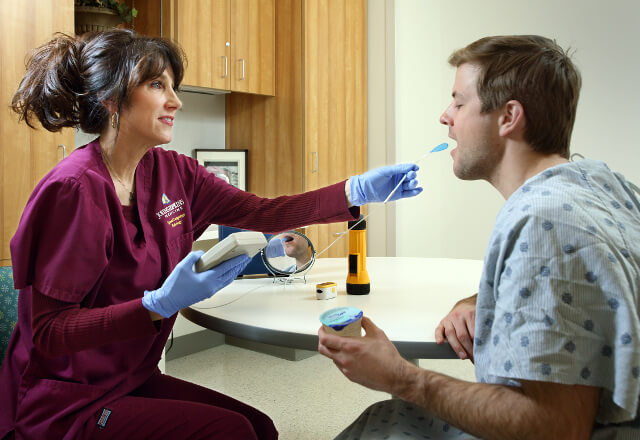
The Johns Hopkins speech-language pathologists(sometimes informally called speech therapists) provide therapy for adults whose ability to speak or swallow has been affected by an injury or illness. Our speech-language therapists assess and treat a variety of speech, language, cognitive and swallowing disorders. This may include retraining for “slurred speech” after a stroke, cognitive therapy after brain surgery, swallowing therapy related to a neurological condition and everything in between.
Our Specialty Areas
Speech-language therapists play a key role in these and other rehabilitation programs:
Schedule An Appointment
Schedule by phone
Johns Hopkins Bayview: 410-550-0414
Sibley Memorial Hospital: 202-364-7665
Schedule online through MyChart
Common Conditions We Treat
-
Swallowing is a complex neuromuscular activity and is susceptible to problems as a result of strokes, head injuries, esophageal disorders, head and neck cancers and neurological diseases like Parkinson’s disease. Swallowing disorders (dysphagia) are of particular concern and urgency because in its severe form, dysphagia can lead to aspiration pneumonia.
Our speech-language pathologists offer clinical evaluations and diagnostic tests to assess the swallow function. We work closely with patients and families to tailor a plan that can promote good eating and drinking habits while preserving health and safety.
-
Difficulty speaking often has to do with problems in engaging muscles involved in speech (apraxia). Speech impairments in adults are most commonly the result of a stroke, head injury or brain surgery.
Treatment focuses on strengthening the muscles used for speech, improving coordination and training in strategies for improving intelligibility of speech.
-
Evaluation of language disorders is a thorough process that includes expressive language, comprehension of language and reading and writing skills. Language problems may include difficulty putting words together (dysarthria), loss of the ability to comprehend words (aphasia) and many others.
-
Speech-language pathologists also evaluate and provide rehabilitation for cognitive deficits, which are most often associated with strokes, head injuries and traumatic brain injuries.
Therapy may include learning strategies in improving attention, memory function, organization, reasoning and problem solving, with the primary objective of returning patients to safe and functional living while maximizing independence.
-
Voice is assessed both perceptually and objectively using diagnostic tools, such as a computerized speech lab. There are many causes for voice disorders (dysphonia). People who use their voice for their employment are often at risk for straining the vocal cords and/or developing nodules or polyps. Other conditions that affect vocal function include spasmodic dysphonia, presbylaryngis, cancers and Parkinson’s disease, to name a few.
Voice therapy may focus on education in vocal hygiene and training in reducing vocal strain and developing a strong and clear vocal quality. Our speech-language pathologists work closely with the referring physicians to develop a treatment plan that is effective and appropriate for vocal rehabilitation.
Meet Our Therapists
Allison Copeland | Speech-Language Pathologist
Expertise: cognitive rehabilitation, communication, neurologic rehabilitation, parkinson's disease, speech therapy, swallowing rehabilitation
Location: Columbia
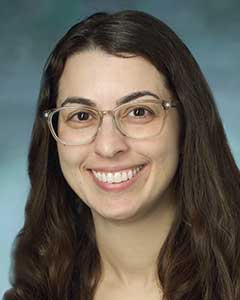
Lyana Frantz | Speech-Language Pathologist
Expertise: cognitive rehabilitation, speech therapy, swallowing rehabilitation
Location: Columbia
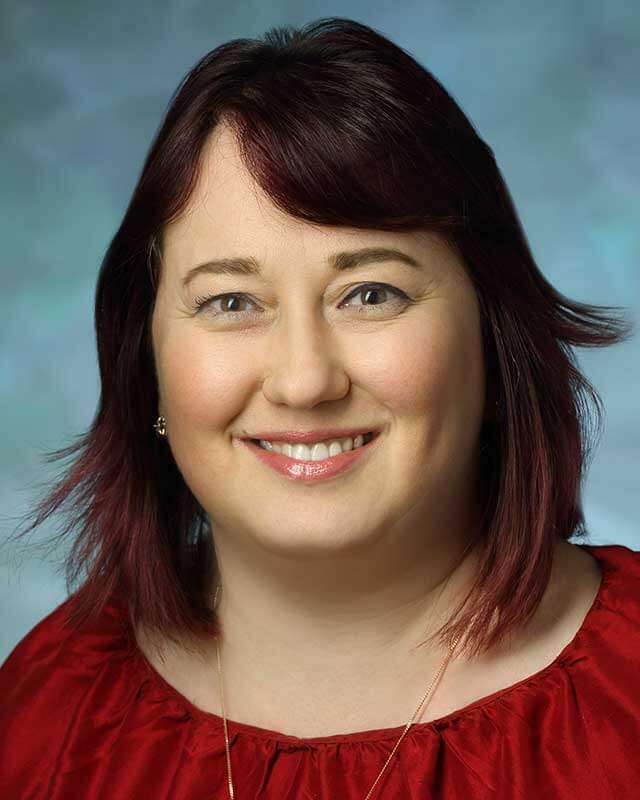
Erin Hollister | Speech-Language Pathologist
Expertise: cognitive rehabilitation, communication, neurologic rehabilitation, parkinson's rehabilitation, swallowing rehabilitation
Location: Washington, D.C.

Meaghan Isaacs | Speech-Language Pathologist
Expertise: cognitive rehabilitation, neurologic rehabilitation, speech therapy, swallowing rehabilitation
Location: Columbia
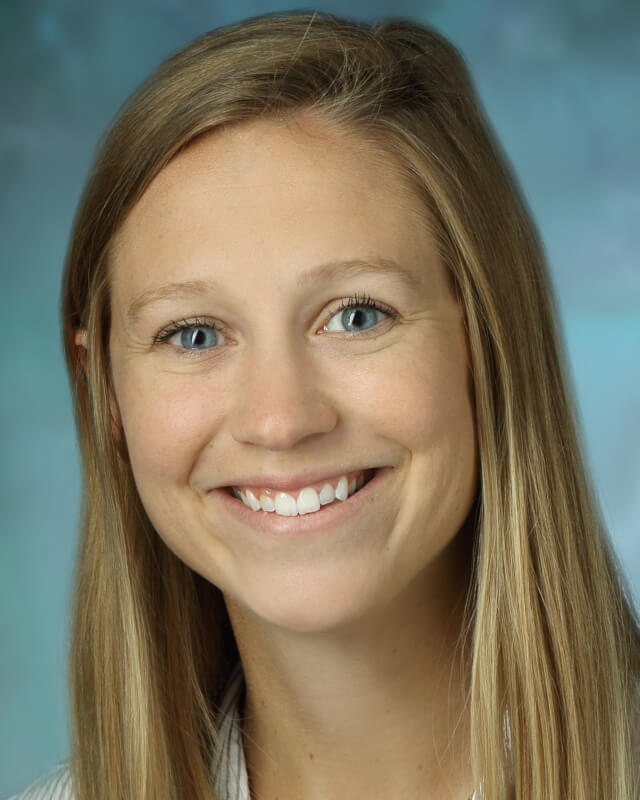
Erin Klein | Speech-Language Pathologist, Clinical Specialist, Outpatient Speech-Language Pathology Fellowship Coordinator
Expertise: cognitive rehabilitation, neurologic rehabilitation, speech therapy, swallowing rehabilitation
Location: Baltimore
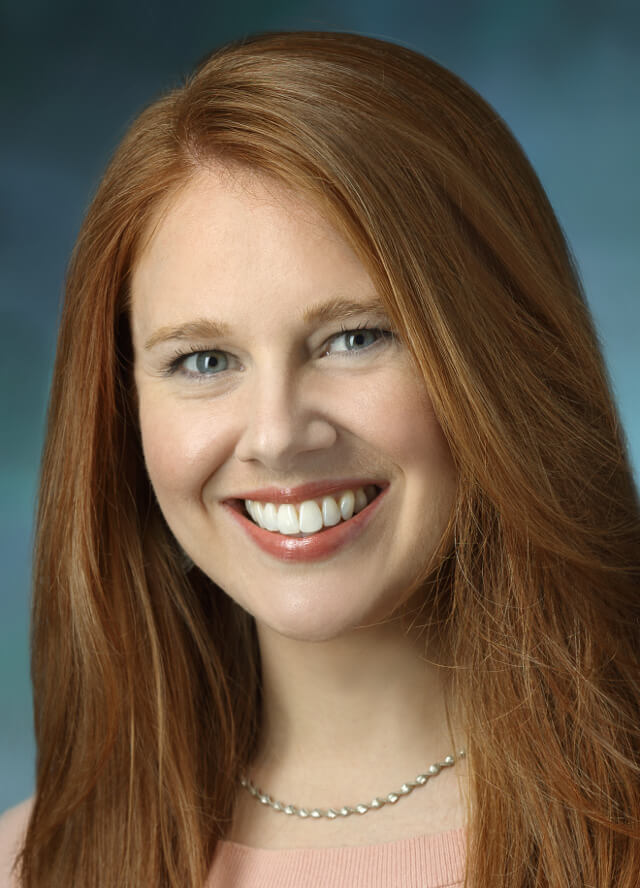
Rachel McConnell | Speech-Language Pathologist, Team Coordinator
Expertise: cognitive rehabilitation, speech therapy, swallowing rehabilitation
Location: Columbia
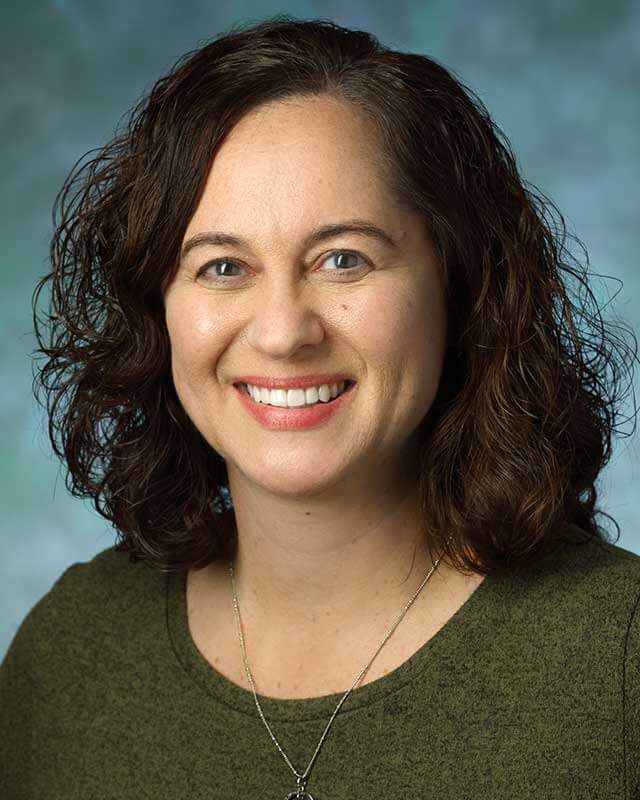
Ashley Ramos-Guasp | Speech-Language Pathologist
Expertise: swallowing rehabilitation, speech therapy, parkinson's disease
Location: Washington, D.C.

Leyna Schroeder | Speech-Language Pathologist
Expertise: cognitive rehabilitation, communication, neurologic rehabilitation, parkinson's disease, speech therapy, swallowing rehabilitation
Location: Baltimore
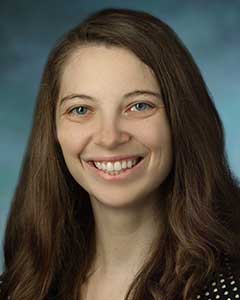
Rebecca Willman | Speech-Language Pathologist
Expertise: cognitive rehabilitation, swallowing rehabilitation, parkinson's disease
Location: Washington, D.C.

Theresa Walker | Speech-Language Pathologist
Expertise: parkinson's disease, neurodegenerative disorders, cognitive rehabilitation, communication, pediatrics, speech therapy, swallowing rehabilitation
Location: Baltimore

Maxwell Zoromski | Speech-Language Pathologist
Certifications: MBSImP Certified
Expertise: cognitive rehabilitation, speech therapy, swallowing rehabilitation, voice therapy
Location: Baltimore

Specialized Programs and Treatments
- Augmentive and alternative communications provide various means of communications for those with speech difficulties.
- Modified barium swallow studies (videofluoroscopy) help assess swallowing and swallow safety; providing an X-ray video that helps diagnose the swallow function.
- LSVT LOUD™ is a specialized treatment for people with Parkinson's disease that helps address voice volume and quality, difficulties swallowing and changes in speech.
- Fiberoptic endoscopic evaluation of swallowing (FEES) exams allow for the assessment of the voice box area and opening of the esophagus, through the use of a small flexible telescope.
- VitalStim® technology allows to combine the power of neuromuscular electrical stimulation with traditional therapy to help speed up dysphagia recovery.
- Speech and swallowing evaluation prior to head and neck cancer treatment helps maximize function during and after the treatment.
